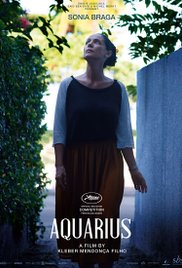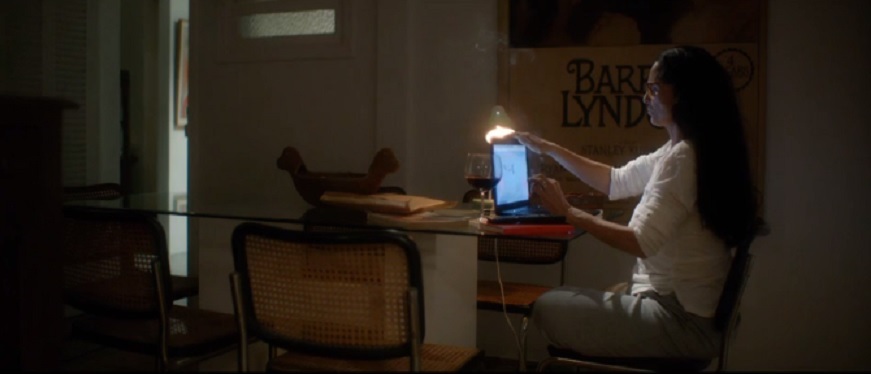DIRECTED BY KLEBER MENDONCA FILHO/PORTUGUESE/2016

Kleber Mendonca Filho’s 2012 debut feature Neighboring Sounds—one of the best movies of its year–was a haunting look at the renters living in a Brazilian high-rise bedeviled by a security team dispatched to provide watchful protection from the city’s crime-ridden street population. Soon, the buildings denizens find this “security” has more nefarious roots than once thought, and as such, the film had deeper political meaning in the context of Brazil’s increasingly dire history. His newest work, Aquarius, lands as a radically extended bonus episode of Neighboring Sounds, though it lacks some of that movie’s drive and visual umph. What Aquarius is equipped with, however, is an implacable, tenaciously sexy lead performance from Sonia Braga, who’s never less than stunning as a headstrong journalist unwilling to abandon her idealistic past. We don’t get to see many performances like this.
Braga portrays Clara, a 60-ish widow and breast cancer survivor living in a modest, slightly dilapidated apartment building—the Aquarius (a long passed age)–that her neighbors, we learn, have abandoned. But she’s intimately connected to the unpredictable ocean, and she’s raised three children in this space, so she’s not willing to relocate at her age. One afternoon, as the baking sun generously seeps in through her seaside windows, she’s visited by the building’s owners, one of them an accommodating young man named Diego (Humberto Carrao). Imposingly smoothing her temples in frustration, Clara has no time for such interruptions, as she’s already aware of their plans–to destroy this quaint building and replace it with a towering super-structure. All of this is an insult to her sharpened reverence of history. These grinning, passive-aggressive sharks have bought out the other renters, but Clara refuses to sell her space, having too many valued memories tied up in it. So the buyout is still waiting for fruition for former renters growing increasingly restless with her impertinence towards this powerful construction company. Non-compliant, she closes the door on Diego, and he slyly slips a company folder over the threshold. She slides it back out, but in it comes again.
Aquarius is equipped with, however, is an implacable, tenaciously sexy lead performance from Sonia Braga, who’s never less than stunning as a headstrong journalist unwilling to abandon her idealistic past. We don’t get to see many performances like this.
This is the baseline for the story’s drama, though it is only occasionally revisited. Mendonca Filho’s newest film sometimes feels like a cousin to another 2012 South American sensation, Chilean director Sebastian Lelio’s Gloria, which was, honestly, a more engaging character portrait (this area of the world is clearly more interested than Hollywood is in the stories of gracefully aging women). What the two movies share most in common are hard-bitten leads who consume life eagerly even though they’ve been inevitably battered by it.

Clara is an acclaimed music journalist whose flat is packed with the spoils of such a life—vinyl, CDs, and even cassettes line the walls along with scads of colorful art works (including a massive Barry Lyndon poster) and loads of books, some of which are authored by her (as we find in one unexpectedly touching scene). Music has clearly steered her spirit tremendously, as the film is copiously accompanied by a terrific song score, much of it in Portugese and, irritatingly, not subtitled. There are many moments of a harried or tipsy Clara seeking solace in, for instance, the samba rhythms of Gilberto Gil or the heavier beats of Queen (whose songs make vivid appearances in both a memorable beachside flashback to 1979 and a much more tense moment in present day, when she tries to drown out the noise from a sex party worryingly put on by the building’s owners in the empty apartment above hers; ironically, the song she selects is “Fat Bottomed Girls”). The film also memorably opens with Taiguera’s lush “Hoje” as backdrop to nostalgic black-and-white photos of the country’s coastline.
Much of the film’s frankly excessive 2-hour-20-minute running time is focused on Clara’s social and family life. Her children are growing more concerned with her situation in this nearly-forsaken building, and it’s clear her thorniest relationship here is with a vapid daughter whose attention to her is fleeting. She has a lively coterie of similarly-aged female friends with whom she adjourns to dance clubs, trying to suss out available, attractive men. And, though she has little difficulty garnering interest there, she has a hungry sex drive that leads her to call a young gigalo over for some business that leaves her feeling uncertain as to how much she really enjoyed the play (given that this is a film from Brazil, we really shouldn’t be surprised at its incessant eroticism, which pops in startling ways). On top of this, she bonds with her maid (who has her own personal tragedies) while doting over her young grandson and a handsome nephew who eagerly introduces her to his pretty new girlfriend from Rio. Always, we can sense a dynamic woman who treasures intensity and longs for the way things once were when appreciation of true art over commerce was dominant. In this, we can understand her wanting to grasp the one constant that’s always given her comfort—her home.

Through it all, it’s Braga that controls the meat of nearly every frame. She can be, at one moment, radically effusive over a song lyric and then sternly shut-down once she senses opposition to her forceful domestic stance (sometimes, both are occurring at once). With her caramel skin and jet-black hair often tied up in a tight bun, Braga rules the film with an iron sensuality and intelligence. This actress has not had a role like this in decades (the last one I’ve been exposed to stateside was from Kiss of the Spider Woman, and before that, 1976’s Dona Flor and Her Two Husbands). One only wishes that the film itself exampled more of her character’s urgency. We often feel ourselves wanting to get back to the nagging conflict at hand, but Mendonca Filho surely demands us to wait things out as we get better acquainted with Clara. It’s not that this blazing woman is difficult to watch or cherish, but a few judicious cuts to the running time could have heightened matters greatly. Still, it’s admirable that the director undermines our expectations of conflict at prime junctures, thus keeping his film surprising and realistic. Though I wish it were prettier, Aquarius ultimately further rewards our patience in its final, comparatively fierce half-hour, marking this picture as a lightly-carved notch in Mendonca Filho’s burgeoning chronicles of Brazilian stamina, with Sonia Braga fittingly standing strong as its heroine.

